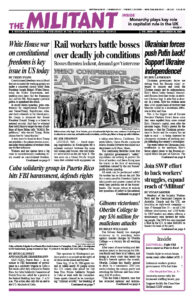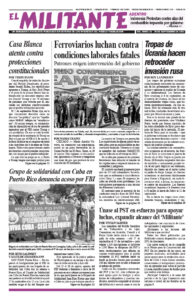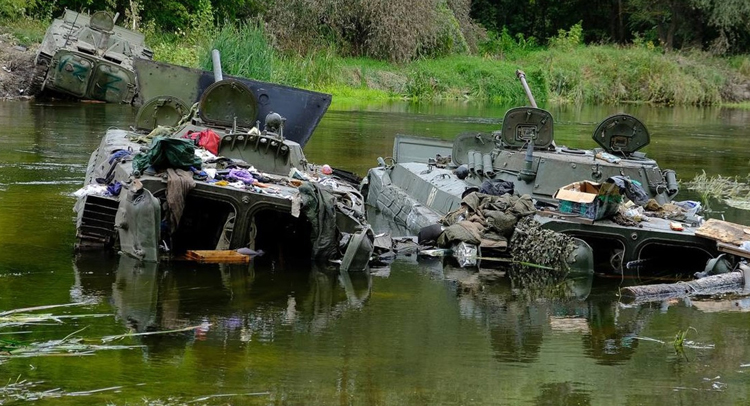Ukrainian government forces are driving back the Russian rulers’ attempts to conquer and crush the Ukraine people and its independence. Kyiv’s forces broke through demoralized Russian front-line troops in northeast Ukraine Sept. 6, who fled in disarray. In a week, Kyiv has retaken more than 3,000 square miles of territory that Moscow seized in a murderous offensive in May and June.
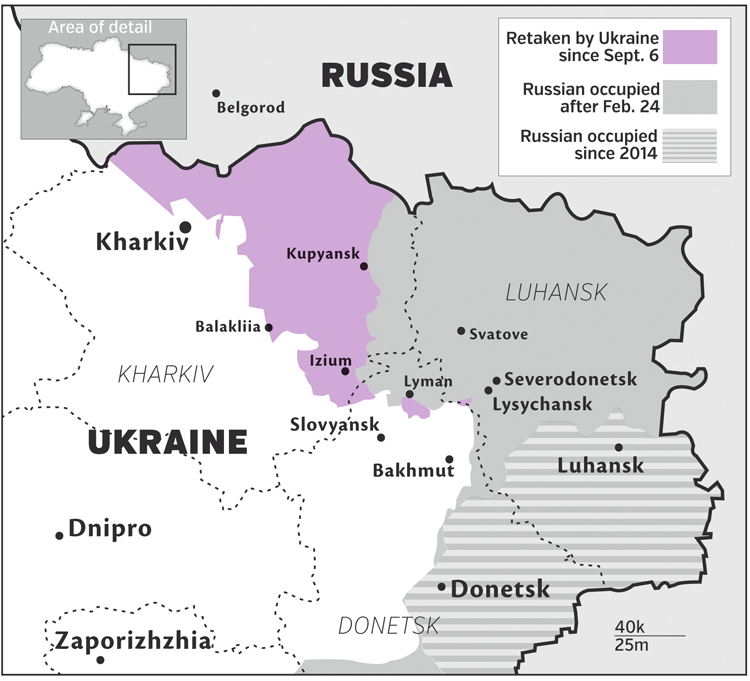
This is the biggest rout of Russian President Vladimir Putin’s forces since they were repelled from areas around Kyiv, Ukraine’s capital, soon after the invasion began. Putin’s pretext for the invasion — that the Ukrainian government is fascist and the country has no right to exist — is being shattered by courageous resistance of working people defending the country’s sovereignty.
The week before the Ukrainian counteroffensive in the northeast, Kyiv’s forces edged closer to the Russian-occupied Black Sea port of Kherson. The Kremlin responded by diverting units and heavy armaments south to double its defenses, leaving its northern front lines thin on firepower. Then Ukrainian forces moved rapidly to liberate Kupyansk, a crucial rail junction, and Izium, a major supply hub. Ukrainian forces reached the Russian border 30 miles north of Kharkiv, Sept. 11.
Fleeing Russian troops abandoned tanks, ammunition and uniforms. From Kharkiv to Kherson, soldiers forcibly conscripted from Moscow-occupied Donetsk were unwilling to die for Putin.
In marked contrast to the increasingly disheartened Russian troops, the morale of Ukrainian forces has been lifted by these victories. Workers are at the forefront of resistance to the invasion, volunteering for the Ukrainian army and the territorial militia. Unionists deliver bulk provisions to civilians forced to flee Moscow’s occupation. Now volunteers are taking relief supplies to newly liberated towns.
In Chuhuiv, one of dozens of towns and villages freed from the occupiers, civilians welcomed Ukrainian soldiers. “Everything is going to be Ukrainian again,” Natalia Khubezhova, 48, told the Sept. 10 Washington Post. Her husband and son are in the army. “We are all ready to go into battle!” she said.
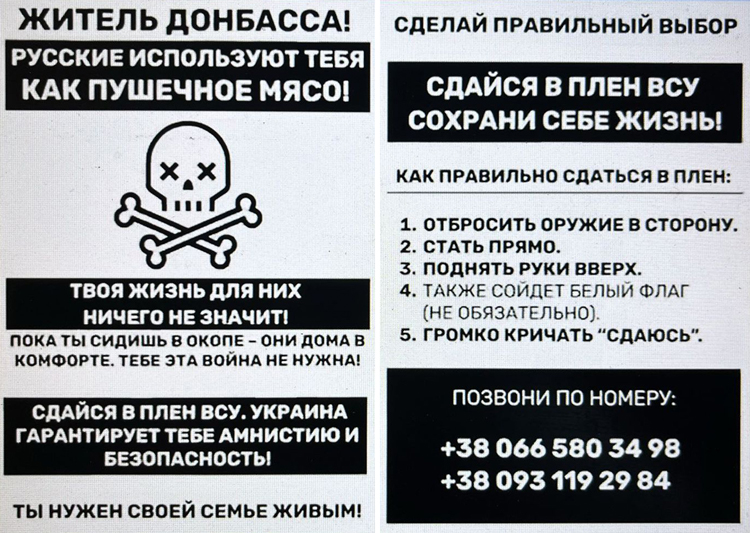
At the same time they are leading in pushing back Moscow’s invasion, working people also confront a serious assault from the government of President Volodymyr Zelensky. Since the war began it has imposed an anti-labor law allowing bosses to rip up union agreements and intensify attacks on jobs, wages and conditions. The law is opposed by both of Ukraine’s national labor federations. Another draft law would allow bosses to enforce 12-hour workdays and fire workers without giving a reason.
The Ukrainian government has recently begun appealing to Russian soldiers not to fight. “Russian Ivan, surrender!” a Ukrainian soldier says on a video directed toward the ranks of the Russian army. “We will protect you from the dictator Putin.”
Ukrainian troops are dropping flyers into the hands of conscripts forced into Russian-led forces from Moscow-occupied Donetsk. They say, “People of Donetsk, the Russians are using you as cannon fodder. Ukraine guarantees you amnesty and safety! Your family needs you alive.” It contains instructions on how to surrender. Some are responding.
The Kremlin claims it is “regrouping” its forces further east and south, where it continues to occupy Ukrainian territory. It retaliated to Ukrainian advances with devastating missile strikes on a power plant Sept. 11, leading to blackouts in Kharkiv.
Divisions, protests deepen in Russia
News of the setback for Putin’s invasion is filtering through state-controlled media in Russia. Pro-Kremlin figures in a panel on the state-run NTV channel condemned the government’s conduct of the war Sept. 9.
“We’ve been told everything is going to plan,” panelist Viktor Olevich said. “Does anyone believe that six months ago the plan was … failing to take Kharkiv?” Another panelist, Boris Nadezhdin, said the Kremlin’s “colonial war methods” made it “impossible to defeat Ukraine.”
Some backers of the invasion are clamoring for the government to impose conscription. Putin has avoided this, knowing it would stir up wider working-class opposition to the war.
Reflecting the resistance to Putin inside Russia, over 90 municipal council members in St. Petersburg and Moscow Sept. 9 urged the Russian State Duma to remove him from power and charge him with treason. They said the war had caused massive human and economic losses and led to the eastward expansion of the U.S.-led NATO alliance.
“Putin’s actions are detrimental to the future of Russia and its citizens,” wrote dozens of deputies from the two councils three days later. The signatories put themselves at risk of charges under laws that make it a crime to “discredit” the Russian army.
Ilya Yashin, a Moscow municipal councilor, faces 10 years in jail for speaking out against the war. He urged other opponents of Putin to tell the truth about the war and “help people overcome their fear.” Yashin is an ally of Alexei Navalny, the leader of the main bourgeois opposition to Putin, who is imprisoned in solitary confinement.
In one of many individual protests against the war, Valeria Sanina stood in Puskhin Square in central Moscow holding a placard, “Let’s stop this war!” before being arrested. The Kharkiv Human Rights Protection Group lists the fines imposed on individual demonstrators, revealing the wide geographic spread of the actions — from St. Petersburg in the north to Sochi in the south, from the Urals to Siberia and Far East.
